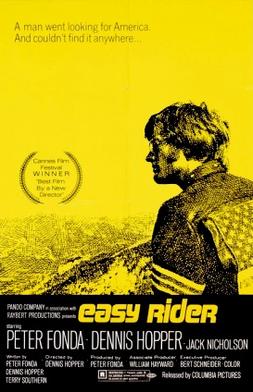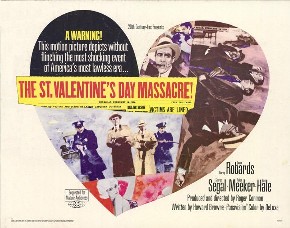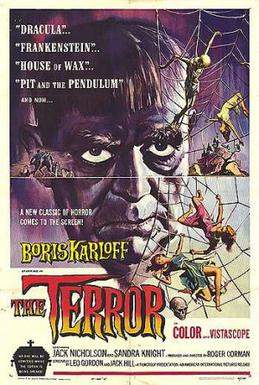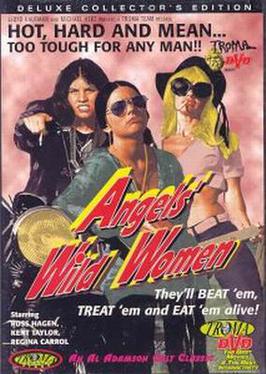
Easy Rider is a 1969 American road drama film written by Peter Fonda, Dennis Hopper, and Terry Southern, produced by Fonda, and directed by Hopper. Fonda and Hopper play two bikers who travel through the American Southwest and South, carrying the proceeds from a cocaine deal. Other actors in the film include Jack Nicholson, Karen Black and Toni Basil. The success of Easy Rider helped spark the New Hollywood era of filmmaking during the early 1970s.

Roger William Corman was an American film director, producer, and actor. Known under various monikers such as "The Pope of Pop Cinema", "The Spiritual Godfather of the New Hollywood", and "The King of Cult", he was known as a trailblazer in the world of independent film.

Peter Henry Fonda was an American actor, film director, and screenwriter. He was a two-time Academy Award nominee, both for acting and screenwriting, and a two-time Golden Globe Award winner for his acting. He was a member of the Fonda acting family, as the son of actor Henry Fonda, the brother of actress and activist Jane Fonda, and the father of actress Bridget Fonda.
American International Pictures LLC is an American film production company owned by Amazon MGM Studios. In its original operating period, AIP was an independent film production and distribution company known for producing and releasing films from 1955 until 1980, a year after its acquisition by Filmways in 1979.

The Trip is a 1967 American psychedelic film released by American International Pictures, directed by Roger Corman and written by Jack Nicholson. It was shot on location in and around Los Angeles, including on top of Kirkwood in Laurel Canyon, the Hollywood Hills, and near Big Sur, California, over three weeks in March and April 1967. Peter Fonda stars as a young man who experiences his first LSD trip.

Samuel Zachary Arkoff was an American film producer, known as the co-founder of American International Pictures.

The St. Valentine's Day Massacre is a 1967 American gangster film based on the 1929 mass murder of seven members of Chicago's Northside Gang on orders from Al Capone. The picture was directed by Roger Corman, written by Howard Browne, and starring Jason Robards as Capone, Ralph Meeker as Moran, George Segal as Peter Gusenberg, and David Canary as Frank Gusenberg.

Hells Angels on Wheels is a 1967 American biker film directed by Richard Rush, and starring Adam Roarke, Jack Nicholson, and Sabrina Scharf. The film tells the story of a gas-station attendant with a bad attitude who finds life more exciting after he is allowed to hang out with a chapter of the Hells Angels outlaw motorcycle club.

The Rebel Rousers is a 1970 American independent outlaw biker film starring Cameron Mitchell, Jack Nicholson, Diane Ladd, Bruce Dern, and Harry Dean Stanton. Filmed in 1967, it did not receive a release until 1970 following the success of Easy Rider. It is one of several motorcycle gang films of the period to feature Nicholson, Dern and Stanton. The film was co-written, produced and directed by Martin B. Cohen in his only directorial effort.

The Terror is a 1963 American independent horror film produced and directed by Roger Corman. The film stars Boris Karloff and Jack Nicholson, the latter of whom portrays a French officer who is seduced by a woman who is also a shapeshifting devil.

Naked Angels is a 1969 American outlaw biker film directed by Bruce D. Clark. Starring Michael Greene as Mother, Jennifer Gan as Marlene, and Richard Rust as Fingers, it provides an insider's perspective at the lifestyle of outlawed bikers. Actor Corey Fischer makes an appearance, as well as Penelope Spheeris in her first role. Naked Angels was the last movie distributed by Favorite Films.
Adam Roarke was an American actor and film director.
The outlaw biker film is a film genre that portrays its characters as motorcycle riding rebels. The characters are usually members of an outlaw motorcycle club.

Angels' Wild Women is a 1972 biker film written and directed by cult director Al Adamson. Preceded by Satan's Sadists (1969) and Hell's Bloody Devils (1970), it is the last in a trio of (unrelated) motorcycle gang films directed by Adamson for Independent-International Pictures Corp., a company he co-founded with Sam Sherman. The plot centers on a group of tough biker babes who leave their cycle gang boyfriends to go on a violent rampage. When a cult leader kills one of the girls, the others go out for revenge.

Devil's Angels is a 1967 American outlaw biker film written by Charles B. Griffith and directed by Daniel Haller. It stars John Cassavetes.

The Filmgroup was a production and distribution company founded by filmmakers Roger Corman and Gene Corman in 1959. Corman used it to make and distribute his own movies, as opposed to ones he was making for American International Pictures. The company ultimately folded, however, lessons from running the company helped Corman make a success later of New World Pictures. Filmgroup also produced early feature work of Francis Ford Coppola, Peter Bogdanovich, Charles B. Griffith, Curtis Harrington, Jack Hill, Monte Hellman, Robert Towne and Jack Nicholson.

Bury Me an Angel is a 1971 American biker film from female director Barbara Peeters, who was script supervisor on Angels Die Hard (1970). She was the first woman to direct a biker film. The film was acquired by Roger Corman's New World Pictures.

Angels Hard as They Come is a 1971 biker film directed by Joe Viola and starring Scott Glenn, Charles Dierkop, Gilda Texter, James Iglehart, and Gary Busey. It was co-written and produced by Jonathan Demme.
Randee Lynn Jensen, born April 28, 1949 is an actress from San Bernardino, California. During the 1960s she acted in films such as The Pit and the Pendulum and The Gay Deceivers. From the late 1960s to the early 1970s, she had a number of parts in exploitation and biker films. She had appeared in over ten films in the biker genre alone. These include The Glory Stompers, The Cycle Savages and The Girls from Thunder Strip. She has also worked in film production, casting and other behind the scenes roles. Prior to her main work in film she had done stage work.














